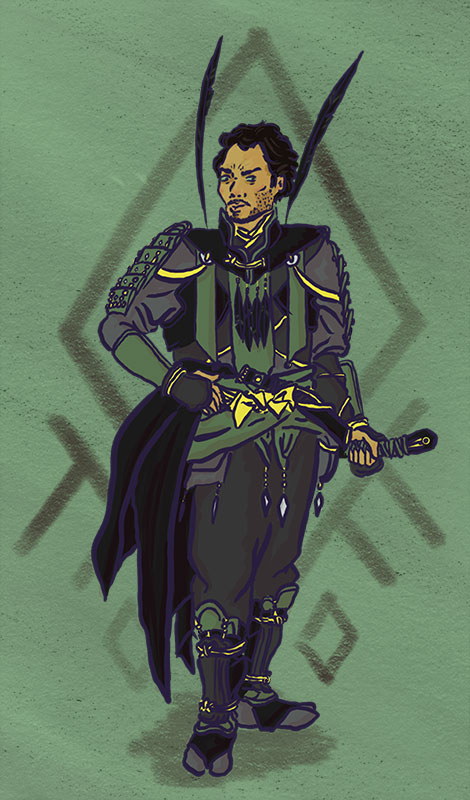Arbitors
Ahkiasaci
Arbitors are representatives of the law within the Inbound Lands, though their jurisdiction is generally limited to meting out judgement in specific regions or as related to specialized fields of knowledge.
The Court of Arbitors is Ahkiasaci, under Ascension Two: Ahkizi. Arbitors are a rank above the Peacekeepers, are equal in rank to Consensors and Mediators, and fall below the rank of Judge.
The uniform of an Arbitor is typically the black of Corvan Order, with the dark and sage greens of legal mediation, and citrine elements signifying the office of the law.
Career
Qualifications
In previous eras, any local individual considered by their immediate societies to be wise, fair, and neutral could serve as Arbitor or Mediator; in modern times, both roles must meet standards of application and continuing practices standards in order to serve.
Arbitors rely on specialized fields of knowledge, thus their educational background in these fields is extensive. This being said, this knowledge may be largely academic in nature, rather than in field experience, though if this is the case, it must be made apparent in the court.
Career Progression
Arbitors are rarely youthful: many transition into Arbitration after (or during) careers in the field.
Those who wish to serve as Arbitor often spend mentorship under other Arbitors, observing the progression of cases, before applying for rank. Even after ascending to full rank, Arbitors are required continue this practice of observation for a certain number of hours per year, in order to maintain their rank and to remain relevant in their practices.
Many Arbitors continue to work within their fields of specialty until called upon, though the Arbitor must disclose if potential conflicts of interest arise based on their current work experiences, and they may be dismissed from duty should the Involved Parties prove that such conflicts create an unnatural bias.
Payment & Reimbursement
Due to the often business-related nature of Arbitration, these services require a monetary or material fee, at a value determined through the court and paid by the convicted party, and which (after any reasonable travel, time lost, and lodging costs are deducated) returns to the immediate governance system.
A reputation for fair, swift, and accurate Arbitration is its own reward.
Other Benefits
In addition to the excitement of the courts and the potential for travel, successful Arbitors - those with reputations for fairness, accuracy, and swift resolution - stand to gain within their own fields of expertise.
Perception
Purpose
Arbitors are used in instances where the decision rests on specialized knowledge, where matters appear to be relatively clear in nature, or where a speedy outcome is necessary or desired. Due to these case attributes, and in contrast to the processes of Consensus, the decision of an Arbitor has few recourses for appeal.
Social Status
Though Arbitors tend to apply after years within their field of expertise, most Arbitors tend to come from middle ranks of their chosen professions: those who find themselves with available time to devote to the courts, and/or those who are seeking to make a name for themselves within the field.
Though higher ranks of the profession may maintain their rank as their career progresses, they may be more selective with their cases, and may even pass lesser-status cases on to newer Arbitors. This is considered to be "Metting the Met," and is standard practice.
Demographics
Due to their ability to resolve minor disputes with swiftness, Arbitors are in high demand. Anyone with a rigorous enough career history may apply to be an Arbitor in their particular field, as long as they maintain their credentials, enjoy the courts process, and have adequate time to devote to both.
It is not entirely uncommon to find someone with a strange and unique specialty who maintains their Arbitor rank, but may only see one or two cases a year.
History
As the Empire grew and peaceminded contact with other Races deepened, both Arbitration and Consensus arose from a need to delve more deeply into legal matters that were muddied by unfamiliar cultures and which required more than simple Peacekeeping.
Though the process of Consensus is the preferred handling of disputes (especially when such issues are complex or require long term solutions), the practice of Arbitration arose from a need to handle cases that were relatively straightforward: whether to help alleviate the caseload of Consensors by giving quick judgment when cases were relatively clear in nature, and/or to find resolution when such cases fell into the fields of specialized knowledge whose implementation would lend quick and adequate clarity to a decision.
Though initial judgments were made by local individuals considered by their immediate societies to be wise, fair, and neutral, it soon became apparent (especially when adding other cultural values to the mix or when the cases impacted several groups), that in the pursuit of fairness, a more rigorous standard must be applied to those who serve in these manners. The formal rank of Arbitor was created.
Operations
Provided Services
Arbitors are used in instances where the decision rests on specialized knowledge, where matters appear to be relatively clear in nature, or where a speedy outcome is necessary or desired. Due to these case attributes, and in contrast to the processes of Consensus, the decision of an Arbitor has few recourses for appeal.
From this level of court and above, an Arbitor may call upon a neutral party of peers, called Members of the Nine (or simply, "The Nine") to serve as an impartial jury for the purposes of helping to reach a resolution. Arbitors may recruit Members of the Nine from the general populace for the purposes of seeking verdict, though in some instances, either the Arbitor or the Involved Parties may request a convention of Tribunal composed of experts related to case matters.
Arbitors may be called in to provide witness within Ranger Tribunals as their areas of expertise may lend clarity along the way to a fair decision, but Arbitors are rarely called to arbitrate the actual cases themselves unless a) a swift judgment must be made AND b) there exists a compromise of the immediate military court due to conflict of interest.
Alternative Names
In some areas of the West, Arbitors may be referred to as "Assessors." However, this name is not common.
Type
Legal
Demand
High. Most court fees are reasonable.
Legality
Arbitors are one of the Court Systems of the Birdfolk. This being said, as Birdfolk jurisdiction holds precedence in most regions, they are legal recourse except in the most unique of cases.






Comments